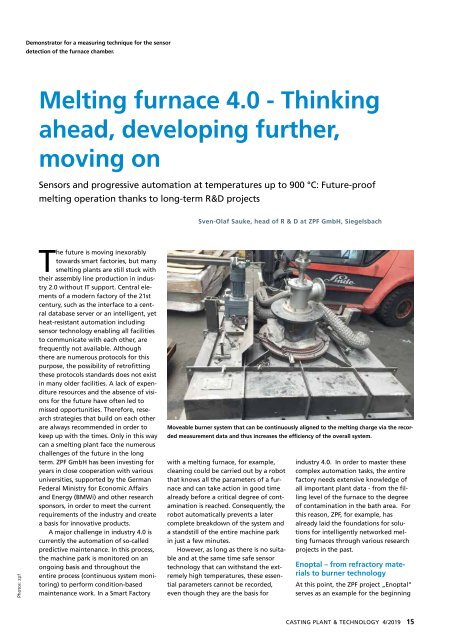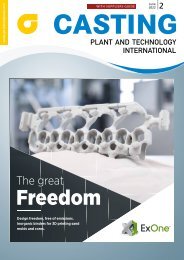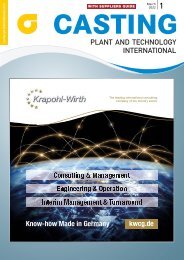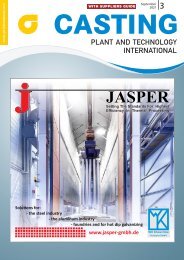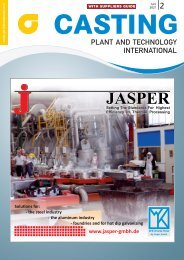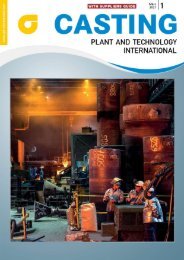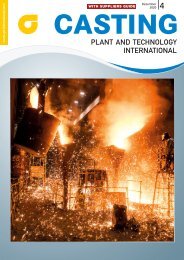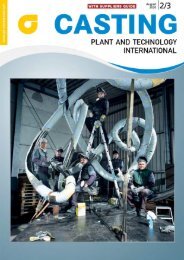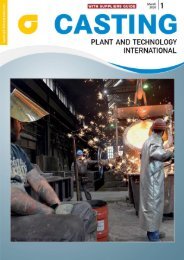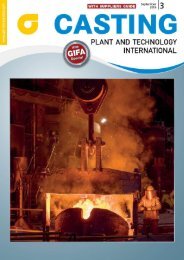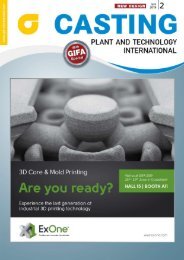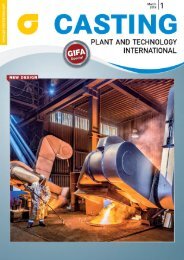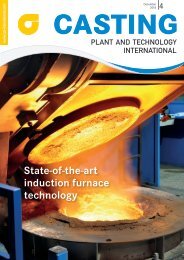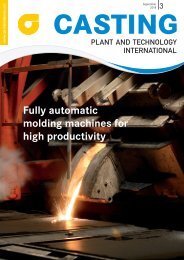CPT International 4/2019
Create successful ePaper yourself
Turn your PDF publications into a flip-book with our unique Google optimized e-Paper software.
Demonstrator for a measuring technique for the sensor<br />
detection of the furnace chamber.<br />
Melting furnace 4.0 - Thinking<br />
ahead, developing further,<br />
moving on<br />
Sensors and progressive automation at temperatures up to 900 °C: Future-proof<br />
melting operation thanks to long-term R&D projects<br />
Sven-Olaf Sauke, head of R & D at ZPF GmbH, Siegelsbach<br />
Photos: zpf<br />
The future is moving inexorably<br />
towards smart factories, but many<br />
smelting plants are still stuck with<br />
their assembly line production in industry<br />
2.0 without IT support. Central elements<br />
of a modern factory of the 21st<br />
century, such as the interface to a central<br />
database server or an intelligent, yet<br />
heat-resistant automation including<br />
sensor technology enabling all facilities<br />
to communicate with each other, are<br />
frequently not available. Although<br />
there are numerous protocols for this<br />
purpose, the possibility of retrofitting<br />
these protocols standards does not exist<br />
in many older facilities. A lack of expenditure<br />
resources and the absence of visions<br />
for the future have often led to<br />
missed opportunities. Therefore, research<br />
strategies that build on each other<br />
are always recommended in order to<br />
keep up with the times. Only in this way<br />
can a smelting plant face the numerous<br />
challenges of the future in the long<br />
term. ZPF GmbH has been investing for<br />
years in close cooperation with various<br />
universities, supported by the German<br />
Federal Ministry for Economic Affairs<br />
and Energy (BMWi) and other research<br />
sponsors, in order to meet the current<br />
requirements of the industry and create<br />
a basis for innovative products.<br />
A major challenge in industry 4.0 is<br />
currently the automation of so-called<br />
predictive maintenance. In this process,<br />
the machine park is monitored on an<br />
ongoing basis and throughout the<br />
entire process (continuous system monitoring)<br />
to perform condition-based<br />
maintenance work. In a Smart Factory<br />
Moveable burner system that can be continuously aligned to the melting charge via the recorded<br />
measurement data and thus increases the efficiency of the overall system.<br />
with a melting furnace, for example,<br />
cleaning could be carried out by a robot<br />
that knows all the parameters of a furnace<br />
and can take action in good time<br />
already before a critical degree of contamination<br />
is reached. Consequently, the<br />
robot automatically prevents a later<br />
complete breakdown of the system and<br />
a standstill of the entire machine park<br />
in just a few minutes.<br />
However, as long as there is no suitable<br />
and at the same time safe sensor<br />
technology that can withstand the extremely<br />
high temperatures, these essential<br />
parameters cannot be recorded,<br />
even though they are the basis for<br />
industry 4.0. In order to master these<br />
complex automation tasks, the entire<br />
factory needs extensive knowledge of<br />
all important plant data - from the filling<br />
level of the furnace to the degree<br />
of contamination in the bath area. For<br />
this reason, ZPF, for example, has<br />
already laid the foundations for solutions<br />
for intelligently networked melting<br />
furnaces through various research<br />
projects in the past.<br />
Enoptal – from refractory materials<br />
to burner technology<br />
At this point, the ZPF project „Enoptal“<br />
serves as an example for the beginning<br />
CASTING PLANT & TECHNOLOGY 4/<strong>2019</strong> 15


